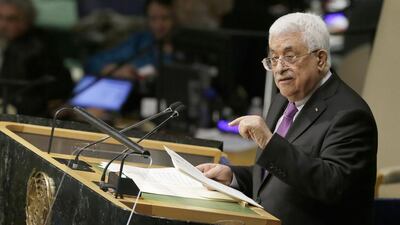Of all the discussions in the United Nations general assembly this year, Palestine hasn’t been top of the agenda. The Palestine conflict paled in comparison to debate about the Syrian civil war and Europe’s refugee crisis. This is understandable given Russia’s latest foray into Syria, but the fact remains that the resolution of the Palestine conflict is still at the heart of any lasting Middle East peace.
Palestinian Authority president Mahmoud Abbas promised a “bombshell” in the days leading up to his remarks in front of the general assembly. What he delivered on Wednesday was a stark warning to the international community that the Palestinians would no longer honour accords with Israel. Referencing the 1994 Oslo Accords, which were designed to be a vehicle for Palestinian statehood that would facilitate an end to Israel’s occupation of the West Bank and Gaza in 1999, Mr Abbas said that Israel had violated nearly every facet of the agreement. He is right. Israeli settlement activity has skyrocketed and Tel Aviv’s control over the West Bank has never been as strong as it is today.
Oslo has failed the Palestinians and allowed Israel to entrench its settlement enterprise on the West Bank and create an unjust status quo that prevents the end of the occupation. As such, the Palestinians must jolt the international community into changing the complexion of the conflict.
The Palestinian issue remains at the heart of a regional peace and, as such, the international community can ill afford to let it enter into a new cycle of bloodletting. Israel’s belligerent behaviour against the Palestinians lays the groundwork for renewed and sustained fighting that could exceed that of the Second Intifada, which broke out in 2000.
The difficult work begins now for Mr Abbas and the rest of the Palestinian leadership. Since Tel Aviv benefits tremendously by having PA security forces control Palestinians on the West Bank at its behest, Ramallah must think hard about a unilateral dissolution of the PA’s security cooperation with Israel. Reforming the PA – itself a creation of the Oslo Accords – is another matter requiring debate and action in the near term.
World leaders might be consumed by Syria at the moment but that doesn’t mean that global civil society has forgotten about Palestine. Debate about the conflict is raging, initiatives to boycott Israel as a means of applying pressure on Tel Aviv are growing and the flag of Palestine has been raised at the United Nations. It is time now for Mr Abbas to make good on his threats and force change in the conflict for the better. The region depends on it.

